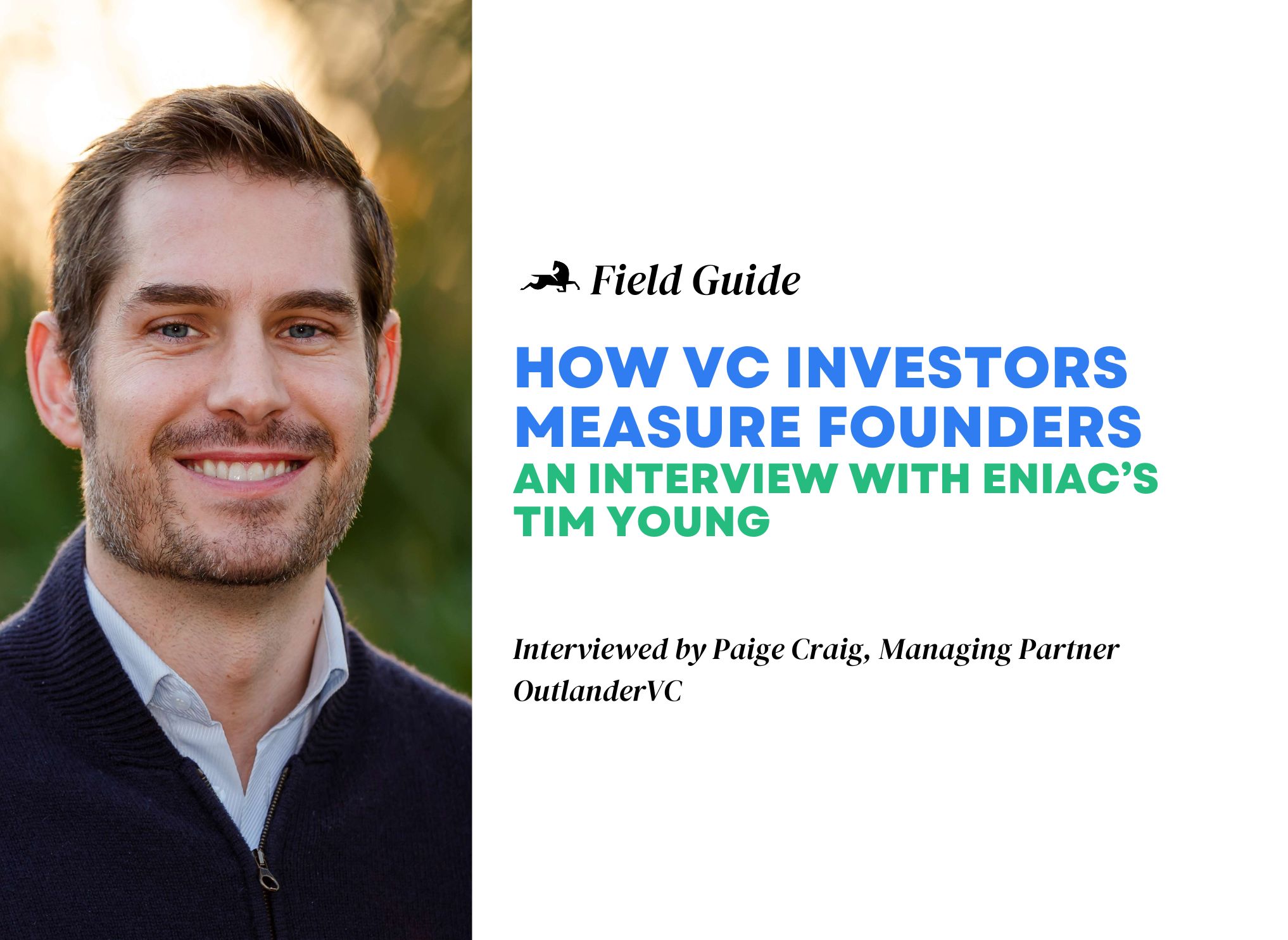How Eniac’s Tim Young Measures Founders:
Three Takeaways from Our Interview
Posted by: AJ Smith
Posted on 10/2/2024

Posted by: AJ Smith
Posted on 10/2/2024

Welcome back to Venture Visionaries, a series from Outlander VC where we dive deep into what distinguishes top investors and explore their unique perspectives on the startup ecosystem.
Join us as we engage with some of the most influential figures in venture capital, uncovering the strategies and insights that have shaped their success and learning how they navigate the evolving world of investing.
From investment philosophies to future predictions, these conversations will inspire entrepreneurs and anyone curious about the venture capital space.
This month, we had the privilege of sitting down with Tim Young, founding partner of Eniac Ventures (Eniac’s portfolio includes AirBnB, Headspace, Hinge, and more). In our conversation, Tim offered his perspective on what sets founders and investors up for success, rooted in his experience on both sides of that equation.
Tim’s unique, grounded outlook on how to identify promising teams and support them through the ups and downs of building a company are what have helped make him (and Eniac) wonderful investors that we love to partner with at Outlander.
You can watch the full conversation here!
And be sure to sign-up for our Fall 2024 portfolio showcase!
Here are three key takeaways from the conversation:
Integrity isn’t optional for Tim. He stresses that while founders might have many areas to grow or develop, trustworthiness is too easily shattered and difficult to repair for him to back a low-integrity founder. The ripple effect is massive: a founder lacking integrity can sabotage their team, erode investor confidence, and ultimately derail the entire company.
Often, integrity (and another key character trait we look for: grit) reveals itself in moments of adversity. How have challenges been handled in the past? Are you an ego-driven leader or a servant-leader who leads by example, respects their team, and constantly builds trust? Ultimately, as Paige expressed in the conversation, “power doesn’t come from rank; power doesn’t come from mission.” It comes from the earned respect of your team, your investors, and your customers.
Tim Young has a simple yet profound question he asks himself before committing to an investment: Would I leave my job and work for this person? It’s a gut check that cuts through all the hockey-stick financial projections and product demos to get at the heart of what matters—leadership.
This is something that we, at Outlander, call being an infectious evangelist: having the storytelling charisma and leadership ability to not only win over your co-founders, but team members, investors, and customers.
This question isn’t just about the founder’s vision; it’s about their ability to inspire trust and loyalty. And we love Tim’s gut check: When Paige was an early investor in Lyft (then Zimride), he described that feeling of wanting to not just get involved as a check-writer, but to actually go and join the team in the mission. Fast-forward 10 years and that litmus test checks out, with Lyft surpassing $5.22B market cap.
Moral of the story for founders: hone your leadership and evangelizing skills. Because if investors can’t see themselves willingly joining a founder’s team, it may be a sign that other talented individuals may feel the same. A great product can only go so far if the founder lacks the ability to attract and retain top talent.
Tim Young is realistic when evaluating founders—he knows no one is perfect. In his words, “There are no 10/10 founders.” Every founder has areas of strength and weaknesses, and as an investor, it’s essential to recognize this early. What matters isn’t having a flawless skill set but having the self-awareness and coachability to improve over time.
For Tim, identifying gaps in a founder’s abilities isn’t a dealbreaker. Instead, it’s about understanding where those gaps are and whether the founder is willing to address them. Are they open to bringing on team members who can complement their weaknesses? Are they willing to seek mentorship or guidance where they lack experience? Having a blind spot and being unwilling to hear about it can make it hard to reach conviction.
Savvy investors know to mostly stay out of the way except when necessary, so chances are that if you are working with an investor who has a track record like Eniac or Outlander, when they are pulling you aside, it’s important.
Final Thoughts
Tim Young’s approach to investing emphasizes a deep commitment to understanding founders as people. It’s a belief that we share at Outlander and is the driver of our Founder Framework. For us, it’s not just about metrics or market opportunities—it’s about asking the right questions and backing people that we believe in.
Watch the full conversation between Paige & Tim here.
Stay Outlandish and, as always, be sure to pitch our team your vision at: www.outlander.vc You can learn more about Eniac at www.eniac.vc
As we explore the unknown of each new investment, our Field Guides are where we document all that we learn along the way.
So, whether you’re actively raising, trying to break into VC, or interested in our game-changing portfolio, our Field Guide's got you covered.
Sign up now for exclusive access to funding opportunities, events/resources from our network of experts, updates from our portfolio, and more!